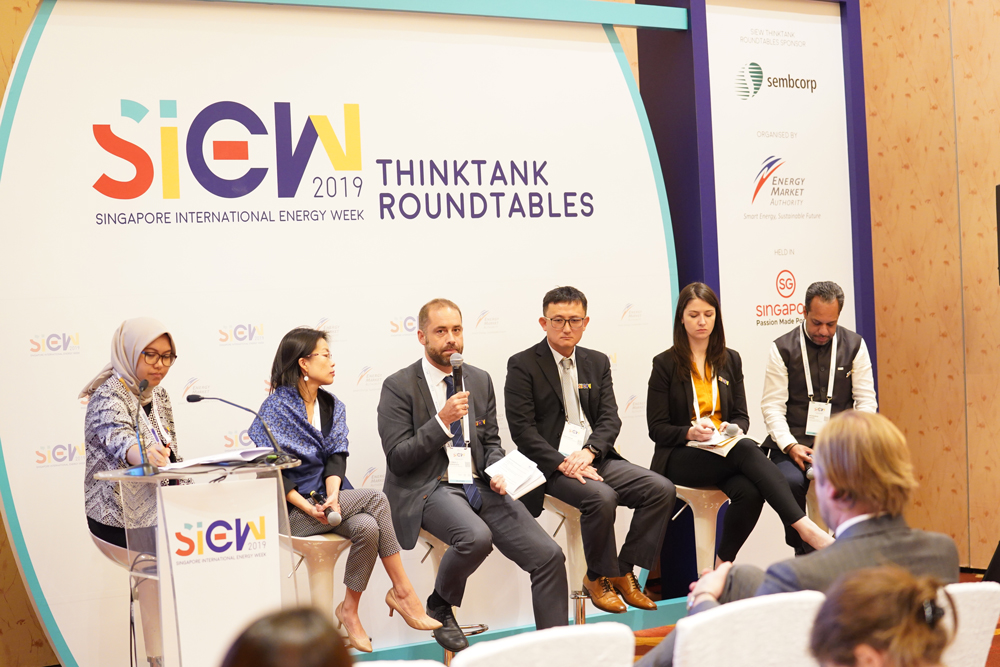By Kheng Hiang, with additional reporting by IRENA

The Thinktank Roundtable F session organised by IRENA on “Global Energy Transformation” opened with a speech by Roland Roesch, Deputy Director, Innovation and Technology Centre, IRENA.
He highlighted that the global energy transformation is not one which is constrained by costs of renewables but rather one that uplifts society, fosters economic growth and boosts employment and sustainability.
Mr. Roesch explained that while the cost of renewable continues to decline rapidly, production cost of renewable energy is now comparable to that of fossil fuels (of $0.05/kWh to $0.16/kWh).
The key message was that about 90 per cent of the solutions to decarbonise, from electrification from energy efficiency improvements, are related to the political agenda to stabilise the global temperature to increase by no more than 2 degrees Celsius as per the Paris agreement.
Nicholas Wagner, Programme Officer, Renewable Energy Roadmaps (REmap), IRENA, presented on key technology solutions to achieve a global energy transformation.
He said that the energy transition is not about climate, is also about social economic consequences. For decarbonising and digitalising the transport sector, he stated that ideas like multimodal transport which can be big in some countries, going from car sharing to ride sharing and alternative modes to e-scooters can revolutionise transport. There is a need to design a system that builds on the synergies.
Dr. Partha Dutta, Senior Vice President, Data Science, Digital & Technology, Sembcorp, shared that information detail collection is important for the front and centre, and from across gas power, energy retailer and renewable energy sectors.
In gas power, highly complex equipment is critical to the national infrastructure, and the goal is to squeeze out efficiency of these critical assets. To get the right kind and amount data is the goal. A lot of digitalising is required to increase the quality of the data from OEM and instrumentation. With this data, there will be new opportunities for efficiency and dispatch operations, which are significant dial movers given power plant footprints around the world.
He shared that in the renewable energy sector, the variability of energy from wind and solar is a challenge from the commercial and sustainability perspectives. Sembcorp is doing a lot of machine learning to increase predictability to give Sembcorp the edge in planning and providing services to their clients.
Dr. Liu Qiang, Co-chair and Secretary-General, Global Forum on Energy Security (GFES), Chinese Academy of Social Science (CASS), shared how, as part of the energy transformation in the past 10 years, regional interconnection for cross-border energy trade contributed to the increase in renewables capacity. He cited examples such as the power connection from Russia for natural gas and oil, importing crude oil from Central Asia, natural gas imports from Myanmar, and electricity trade with Laos.
He also pointed out that China’s economic growth is slowing down, with quarterly GDP growth falling from 6.5 to 6.2 per cent. This will lead to a reduction in the share of coal and natural gas and enable China to integrate more renewable power to the grid.
The second session highlighted the socio-economic impact of such energy transformation in terms of GDP growth, employment creation, and human welfare improvements. These impacts have found to be positive at the global level while that on individual countries and regions depends not only on the level of policy ambition, but also on the degree to which they leverage and enhance their domestic capacities.
The panelists concurred that for global energy transformation, we need good investment plans, a change in attitude towards transformation, cultural changes, regulation to make the market environment conducive and economic subsidies that are more targeted to consumers and the general population.
Dr. Arunabha Ghosh, Founder-CEO, The Council on Energy, Environment and Water concluded the session by stating: “The trilemma of sustainability, growth and jobs can be squared off with equilibrated polices because the future is going to decarbonise, digitalise and decentralise.”